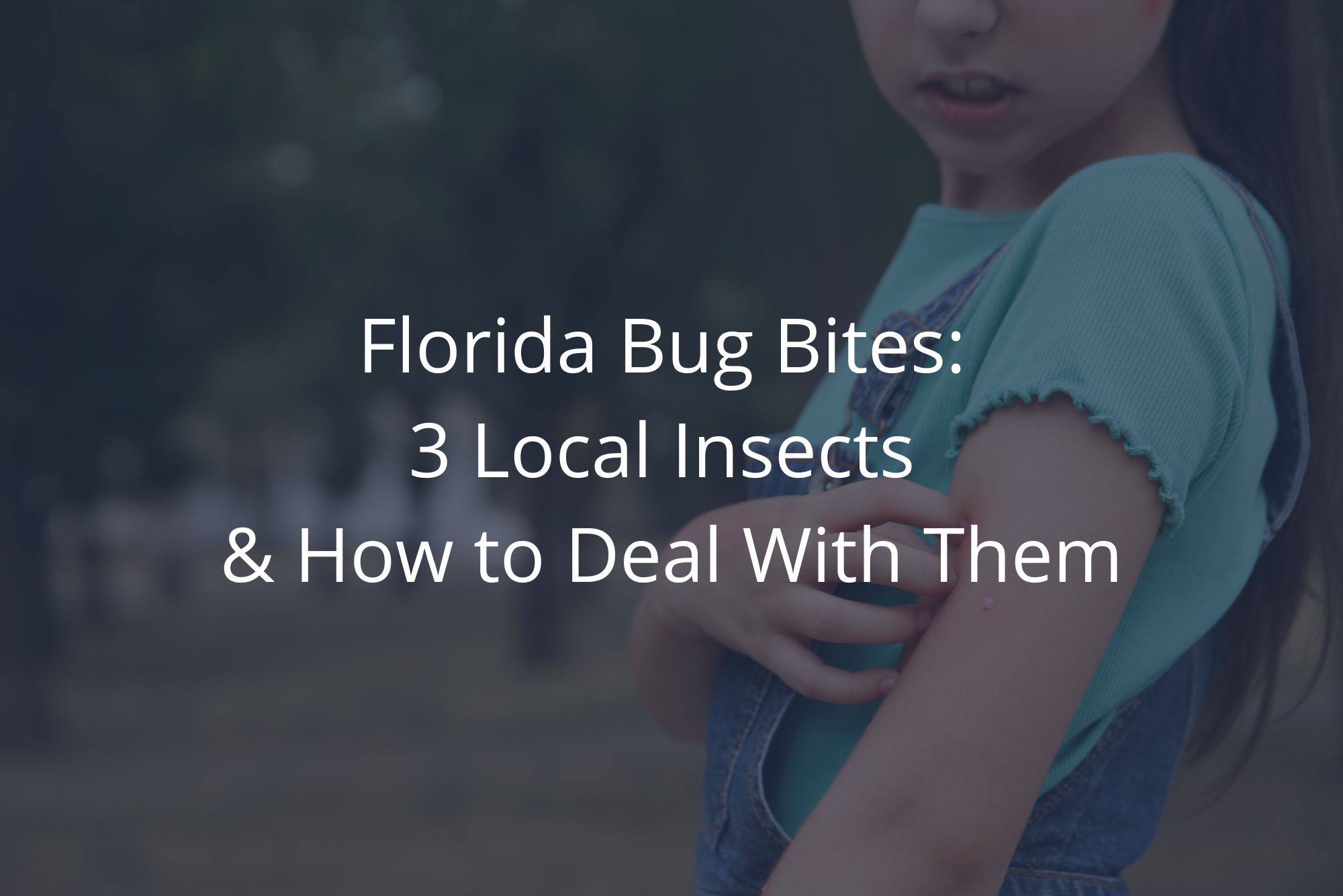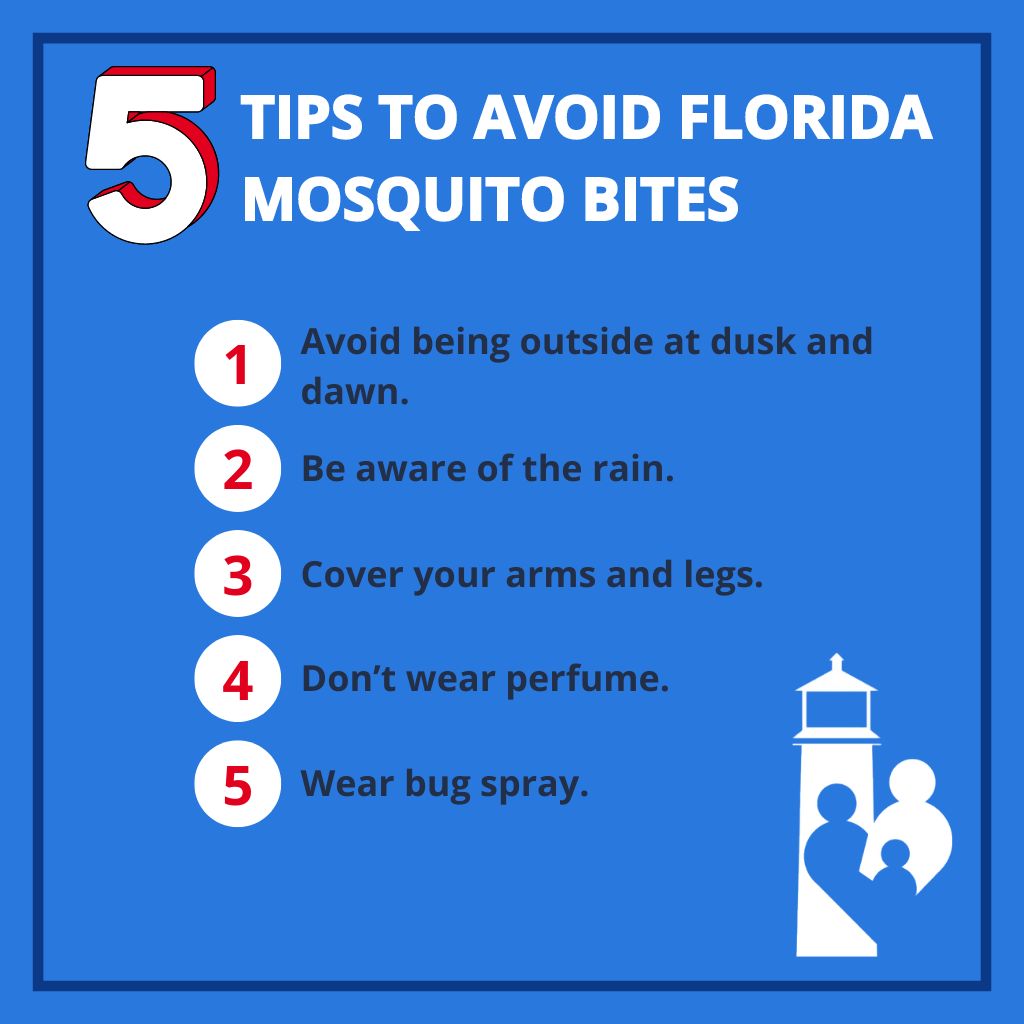
Living in Florida has definite advantages; we love it, or we wouldn’t live here. But there is an undeniable irritant we all have to deal with: insects that sting and bite.
From general annoyance and frustration to full-on infection, Florida bug bites are no fun. Let’s explore how to avoid a range of Florida bug bites and stings, and how to treat them when avoidance fails.
Florida Mosquitos
One of the most obvious insect irritations that comes to mind if you live in Florida is mosquito bites.
Luckily for us, most mosquitos in Florida — and all over the United States — are considered “nuisance mosquitos” and don’t carry contagions or disease, according to Centers for Disease Control (CDC).
The nuisances these pests cause mostly include itching and its related inconveniences. But itching can lead to all sorts of issues: general annoyance, trouble sleeping, and infection from scratching.
How to Avoid Florida Mosquito Bites

It can be hard to avoid mosquitos in Florida, but here are some tips to help you dodge those little blood-suckers:
- Avoid being outside at dusk and dawn. Mosquitos are very sensitive to sunlight, which can kill them. As a result, they are most active — and inclined to snack on you — at dusk and dawn.
- Be aware of the rain. Just like they avoid sunlight, mosquitos can’t tolerate dry weather. They thrive in damp conditions and lay their eggs in water. If you’ve just had a heavy Florida rain and you’re eager to avoid mosquitos, maybe let things dry out for a day or two before you take a long walk.
- Cover your arms and legs. Wear long sleeves and pants if you can. Many lightweight fabrics could cover your skin without making you too hot. It’s also recommended to wear light-colored clothes, as mosquitos are more attracted to dark and bright colors.
- Don’t wear perfume. Minimizing perfumes and sweet scents will make you less attractive to mosquitos. Scented body products like lotions, shampoos, and perfumes can lure mosquitos to you — especially if the scent is a floral one.
- Wear bug spray. Keep mosquitos at bay with bug repellent. DEET is an especially effective bug repellent that breaks down quickly instead of lingering in the body. If you prefer to avoid chemicals, you could try a more natural repellent, such as a eucalyptus blend.
How to Treat Florida Mosquito Bites:
In addition to providing symptom relief, treating the itching from mosquito bites also prevents further complications. Prolonged scratching, for example, can lead to a skin infection, including impetigo (a staph infection under the skin).
To soothe itching, I give all my patients a small vial of menthol and benzocaine to apply directly to itchy bug bites. You could also use rubbing alcohol, calamine, or topical Benadryl.
Anecdotally, I’ve heard that a product called the “Bug Bite Thing” is effective for some people. It’s a suction tool that claims to pull the insect saliva or venom from the skin, relieving itching and swelling.
Red Fire Ants in Florida
While mosquitos cause itching, fire ants cause immense pain. After being bitten by fire ants, it’s common for the affected area to become swollen. This is normal, though if the swelling spreads up the limb or all over the body, it needs to be treated urgently. This is an allergic reaction, which can be life-threatening.
Typically, however, these particular Florida bug bites result in localized swelling and painful white pustules. The white pustules develop due to your immune system’s reaction to the bug bites, and they don’t usually indicate infection. However, it’s a good idea to avoid popping them, which can lead to infection.
How to Avoid Red Fire Ant Bites:
This is probably the hardest advice for most Floridians to swallow, but I recommend wearing shoes. Fire ants bite when stepped on; if you accidentally walk into their nests, you’ll fare far better with shoes on.
In addition to being well-shod, be observant. You can usually spot fire ant mounds if you watch where you step.
How to Treat Red Fire Ant Bites:
- Remove the ants by hand. Use your hands to get rid of the fire ants. Spraying them with water can cause them to latch on with their jaws.
- Treat the skin. Just like with mosquito bites, try rubbing alcohol, calamine lotion, or topical Benadryl. Over-the-counter hydrocortisone cream can also help.
- Ice the area. Reduce inflammation, pain, and swelling with ice.
Florida Wasps and Bees
Stings from wasps and bees don’t cause problems other than pain and swelling — unless you have an allergic reaction to them. In the case of allergic reactions, bee stings become a medical emergency.
In most cases, though, wasp and bee stings are simply painful inconveniences. People often think they have an infection because of the surprising amount of swelling, but it’s just the body’s reaction to the insect’s venom.
How to Avoid Wasp and Bee Stings:
Bees and wasps rarely attack unless they are provoked or perceive a threat. Literal avoidance is the best way to stay free of stings. Steer clear of their nests, hives, and favorite flowers, and you should be fine.
How to Treat Wasp and Bee Stings:
- Remove the stinger. If the stinger remains in your skin, pull it out. Some sources recommend removing the stinger with a sturdy, thin edge — like flicking it off with a credit card — because using your fingers can squeeze the toxin deeper into your skin.
- Ice the area as soon as possible. Ice will reduce the swelling.
- Take oral Benadryl. Over-the-counter oral Benadryl can also reduce swelling. Take it as directed by the packaging or your doctor.
Fight Those Florida Bug Bites
At my practice in Jupiter, Florida, I often hear about my patients’ encounters with all the stinging and biting insects Florida has to offer. Fortunately, most Florida bug bites are more annoying than dangerous, and you can avoid and/or treat them with simple over-the-counter and home remedies. Just remember to seek medical attention immediately if you experience an allergic reaction!

Dr. David Rosenberg
Dr. Rosenberg is a board-certified Family Physician who obtained a BS in Chemistry at Georgia's Mercer University in 1983 and a medical degree from the University of Miami in 1988. He completed his residency in Family Medicine at The Washington Hospital in Washington, Pennsylvania, in 1991 and then practiced Emergency Medicine at Palm Beach Gardens Medical Center for two years. In 1993 he started private practice in Jupiter.
Dr. Rosenberg has been married to his wife Mary for 38 years and they have three grown children together. Some of his interests include being a huge baseball fan, sailing, snow skiing, self-development, and learning to play piano.
